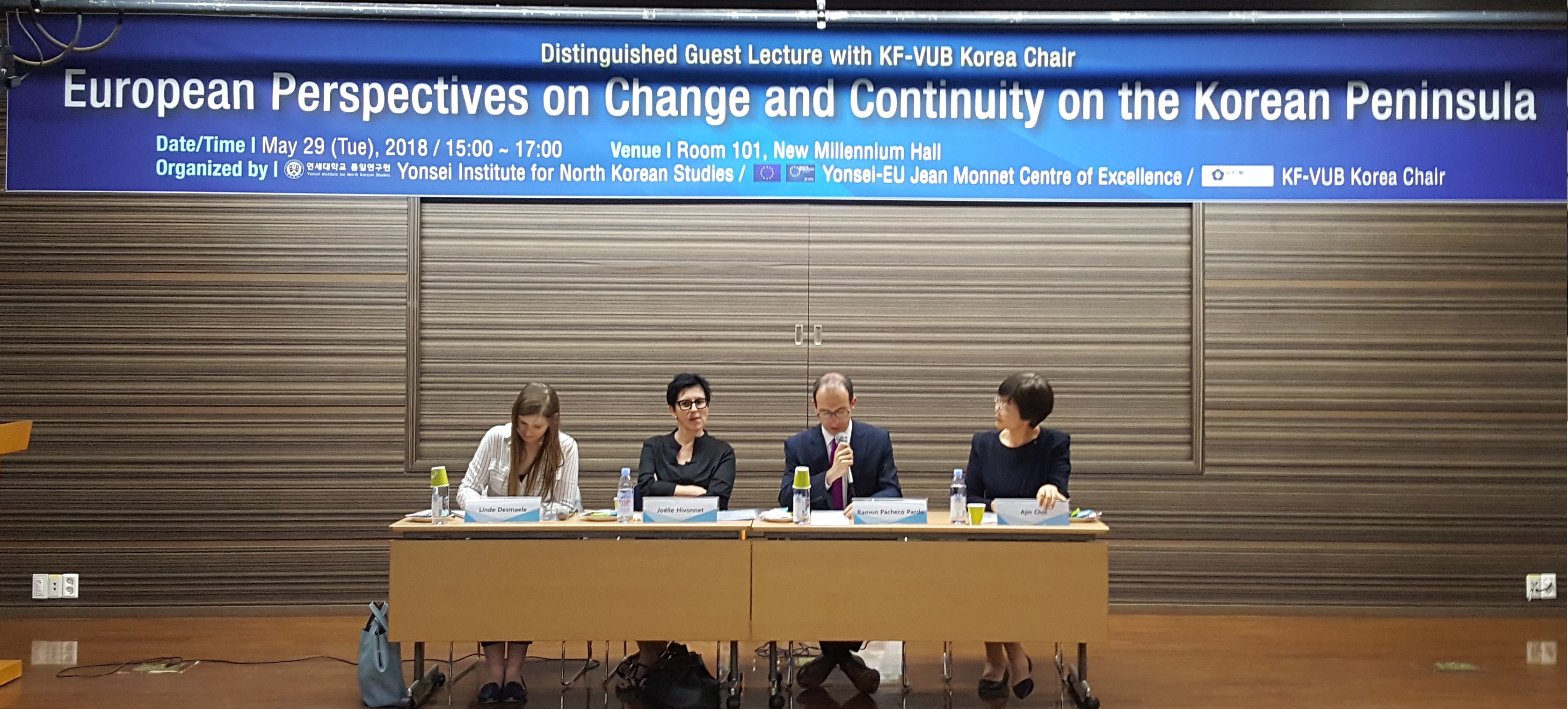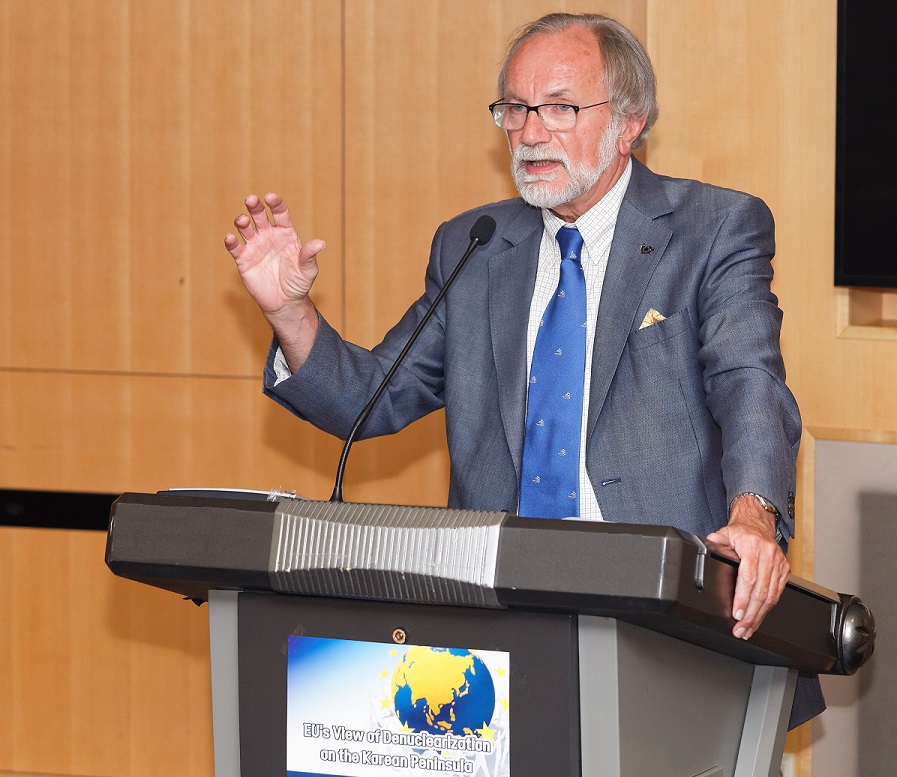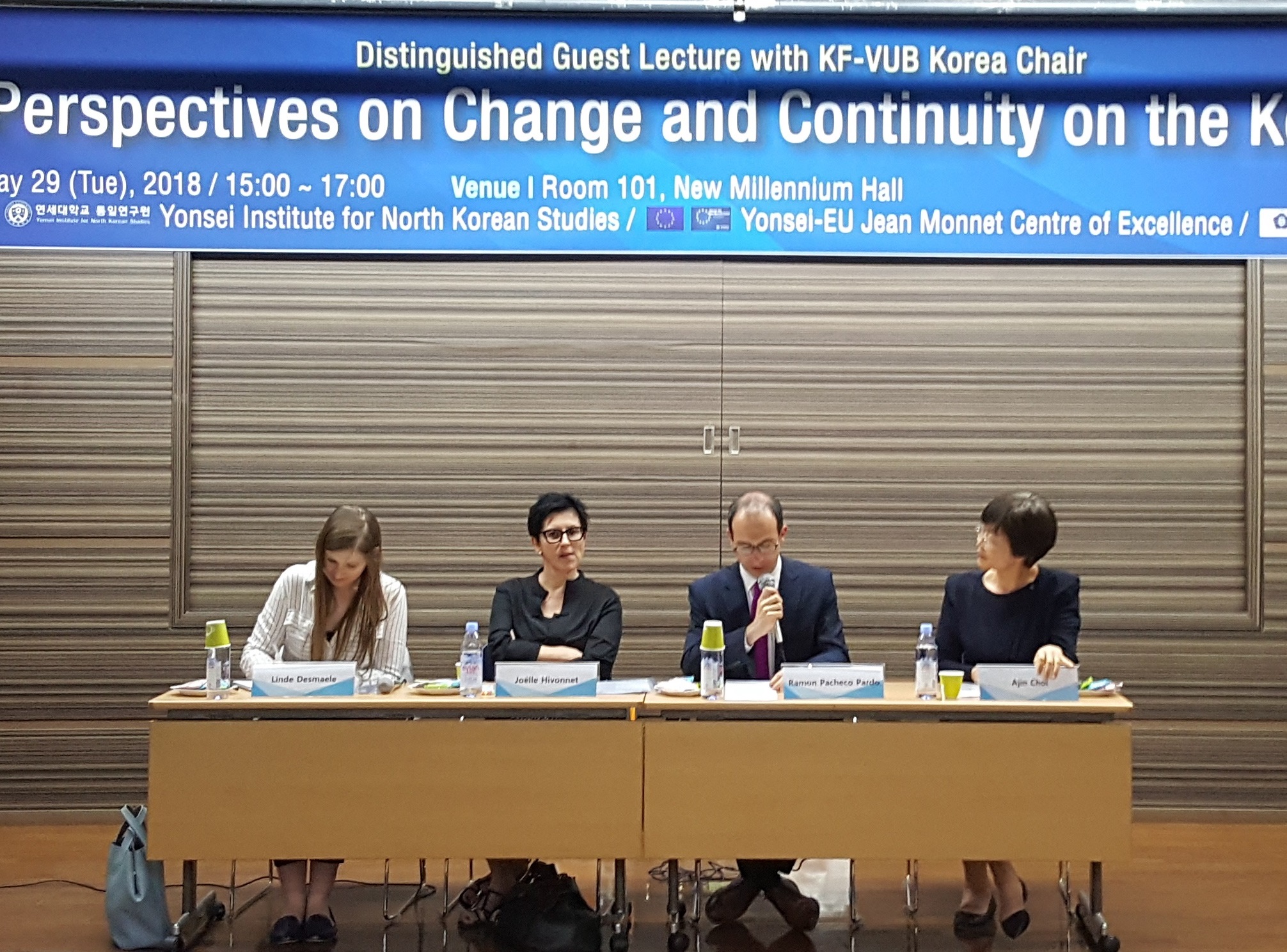- Research on Korea: EU's Role in Korean Peninsula Affairs October 18, 2018
-
Representatives of Europe discuss how the EU will make an effort to bring stability in the Korean Peninsula
The year 2018 celebrates 55 years of diplomatic relations between the European Union and the Republic of Korea. As the Korean Peninsula remains in the global spotlight for its stability and continuity issues, the European Union is making a collective effort to find its strategic place as a relevant player between all actors involved in the peace-making process.
Distinguished representatives of Europe recently made various visits to Yonsei University to meet with Yonsei leadership, faculty, and students to discuss how the EU will make an effort to contribute to bringing stability in the Korean Peninsula and promoting cooperative relations between Europe and Korea.
Distinguished Guest Panel with Ramon Pacheco Pardo, KF-VUB Chair
 Distinguished Guest Lecture with KF-VUB Korea Chair
Distinguished Guest Lecture with KF-VUB Korea ChairOn May 29, 2018, Yonsei University hosted a distinguished guest lecture, inviting Ramon Pacheco Pardo, KF-VUB (Korea Foundation-Free University of Brussels) Chair of the Institute for European Studies at Free University of Brussels, and three experts from Europe to discuss European perspectives on change and continuity on the Korean peninsula.
Jointly organized by Yonsei Institute for North Korean Studies, Yonsei-EU Jean Monnet Centre of Excellence, and the KF-VUB Korea Chair, the event’s panelists also included Joelle Hivonnet, Charge d’affaires of the EU Delegation to the Republic of Korea, Linde Desmaele, PhD Candidate of Free University of Brussels, and Laura Bicker, BBC Seoul correspondent.
Pardo kicked off the discussion by identifying three goals of the European Union: commitment to regional stability, non-proliferation of mass destruction weapons, and human rights. Regarding North Korea, he supported Moon Jae-in’s efforts in securing peace with the rogue state and his position as the “driver’s seat.”
According to Hivonnet, the role of EU is a broker that facilitates dialogue with North Korea, provide technical expertise, and continue aid. “We don’t have direct interest,” she said. “EU can provide technical assistance, but I want to mention when dealing with mass destruction, these are issues of biological and chemical weapons. Health and humanitarian aid is where we want to play a bigger role.”
She further stated that the EU will continue to finance agricultural projects such as forestry and soil erosion, and verified their technical expertise and experience in developing multilateral agreements during the Iran nuclear deal. Although Trump’s unilateral withdrawal has undermined the nuclear accord — also known as the Joint Comprehensive Plan of Action (JCPOA), the EU still defends the deal.
The EU’s role as a facilitator rather than a mediator, was further emphasized by Bicker. Although sanction relief is out of the question for the time being, “sanctions are simply a means to an end,” she notes. “Sanctions cannot make them [North Korean] denuclearize, but it can bring them to the table. Dialogues are the key to the actual denuclearization.”
During the Q&A session, Professor John Delury of Graduate School of International Studies asked a somewhat provocative question — the possibility of Brussels inviting Kim Jong-un to Europe. The panel, amused, gave a provocative answer in return and stated that the EU has no Delegation in the DPRK and has only conducted dialogues. They also questioned the idea of bringing Rocket Man to Brussels, and what they could achieve from such an encounter.
*On October 17, 2017, the Korea Foundation (KF) and the Institute for European Studies of Free University of Brussels (VUB) jointly launched the opening of the new KF-VUB Korea Chair to play a strategic role in furthering EU-Korea relations. The position is the first of its kind in Europe to become the primary contact point on issues related to the Korean peninsula and will initiate activities and partnerships to contribute in bringing stability to the Korean Peninsula and increase possibilities for further cooperation on bilateral, regional, and global levels.
Special Lecture of H.E. Michael Reiterer, EU Ambassador to the Republic of Korea
 EU Ambassador Michael Reiterer giving a lecture at Yonsei University
EU Ambassador Michael Reiterer giving a lecture at Yonsei UniversityOn June 4, 2018, Ambassador Michael Reiterer of the European Union to the Republic of Korea visited Yonsei University as a guest lecturer for the 9th Yonsei Center for Advanced Research in Integrated Future Society (CARIFS) Special Lecture. He shared his insight on EU’s view of denuclearization on the Korean Peninsula to students of the Areas Studies Program of the Yonsei Graduate School. Ambassador Reiterer met with Yonsei leadership, including President Yong-Hak Kim and Professor Doowon Lee, Vice President for International Affairs, and Professor Sang Tu Ko, Director of the Center for Europe Studies, to discuss how higher education institutions can play a role in promoting mutually beneficial relationships between Korea and EU countries.
The Institute of East & West Studies at Yonsei University conducts academic research activities and scholar exchange programs to strategically advance education and research between EU and Korea, currently housing the Center for Europe Studies and the Yonsei-EU Jean Monnet Centre.
show mobile menu
mobile menu




